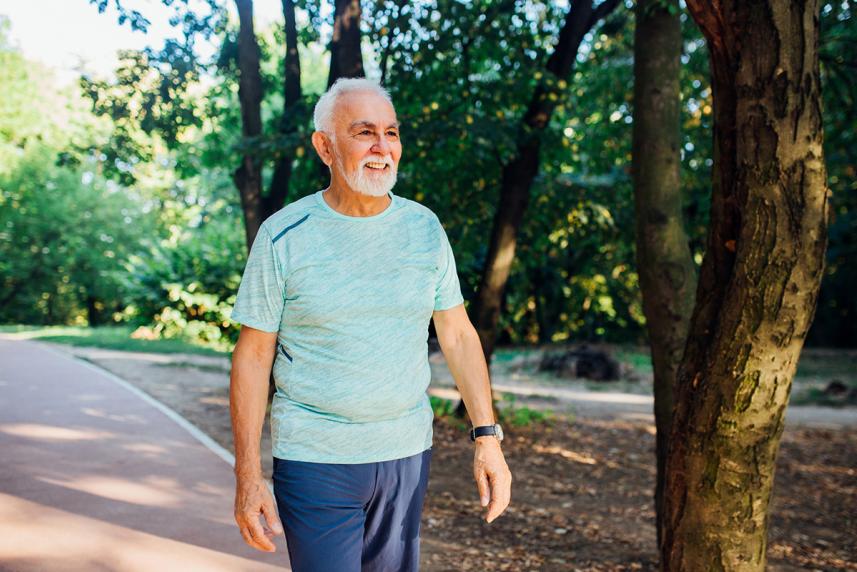
Find out if you qualify for an Aetna® Dual Eligible Special Needs Plan — we’re ready to help.
Whether you need advice on what to eat or help tracking your blood sugar levels, these tips can make the whole process easier

If you have diabetes, it may sometimes seem like your whole life is about managing your numbers, tracking what you eat and staying on top of your overall health. It can feel overwhelming. The good news: There are things you can do to make daily diabetes maintenance easier.
Try these six tips to take the pressure off of living with diabetes and improve your well-being.
Studies show that people can manage their diabetes better when they have support from loved ones. A strong support group can help you make positive changes. They can help you cook a healthy meal, for example. Or they can encourage you to exercise by offering to go with you on a walk or bike ride. Friends and family can remind you to take your medications and schedule doctor appointments. They can also help you when you check your blood glucose levels.
On the other hand, it’s also important to stay away from people who aren’t supportive. This might mean a relative who still brings desserts to your house when you’ve asked them not to, or one who downplays your diabetes. In those cases, it might help to bring the person with you to a doctor’s appointment or a session with your dietitian. Then they have a chance to understand the treatment plan.

Find out if you qualify for an Aetna® Dual Eligible Special Needs Plan — we’re ready to help.
When it comes to exercise, it’s key to remember that everyone is at a different level. One good rule of thumb: If your fitness level is low, start slow. Some people get out of breath when they walk from the bedroom to the bathroom. In those cases, they can start by walking for two minutes, four times a day, then move up from there.
Over time, you can build up until you can walk for at least 30 minutes most days of the week. Once you’ve reached that point, you can add in light hand weights, says Sheri Colberg-Ochs, PhD. She's a professor emerita of exercise science at Old Dominion University in Norfolk, VA. (Don’t own hand weights? Full water bottles work just as well.) Or add in fast intervals, such as picking up the pace for 30 to 60 seconds at a time, says Colberg-Ochs.
While you can do your workout all at once, it’s also fine to break it into three smaller sessions like a 10-minute walk after each meal. People with type 2 diabetes who did that saw their blood sugar levels drop about 12 percent, compared to those who took a longer 30-minute walk at another time. You can study these findings in the medical journal Diabetologia.*
“I tell all my patients with diabetes that wellness and prevention begin as soon as their feet hit the floor in the morning,” says Marie Ruggles, MS, RD, CN, CDE. She’s a clinical nutritionist and certified diabetes educator in Long Island, NY. “It’s so important that you view everything you do to stay healthy as an act of self-love.”
With that in mind, it helps to throw a bit of pampering into the mix. Ruggles suggests that all her patients massage their feet with essential oils in the evening. “It helps increase circulation, especially if they have diabetic neuropathy,” she explains. “But some people love it so much they rarely miss a night. It boosts their confidence that they’re doing everything they can to keep their body healthy, including their feet. And it feels good in the process.”
If you have type 2 diabetes, Medicare may pay for three hours of dietary counseling your first year, and two hours every year after. But very few patients with diabetes on Medicare take advantage of it: Only about 100,000 Medicare members received nutrition counseling in 2017, for example.*
There are a bunch of high-tech tools that can help you manage your diabetes. And they’re often covered by insurance. “These are easy enough for anyone to use. They can be really helpful for keeping your blood glucose levels in check, which can be harder to manage as you get older,” says Gary Scheiner. He’s a certified diabetes care and education specialist. “They can’t take the place of your medical team, but they can be helpful between appointments.” These digital tools include:
If you have diabetes, you’ll need more than just regular wellness check-ins with your doctor. Fortunately, there is a whole team of medical providers who can help you manage the disease. They include:
If you qualify for both Medicare and Medicaid, you may be eligible for an Aetna® Dual Eligible Special Needs Plan (D-SNP).
If you're 65 or older and have an eligible chronic condition, you may qualify for an Aetna® Chronic Condition Special Needs Plan (C-SNP). Click here to find out if an Aetna C-SNP is available in your area.
You may be eligible for an Institutional Special Needs Plan (I-SNP) if you’ve lived (or plan to live) in a participating facility for 90+ days or you have Medicare Part A (hospital insurance) and Part B (medical insurance).
*Reynolds A, Mann J, Williams S, et al. Advice to walk after meals is more effective for lowering postprandial glycaemia in type 2 diabetes mellitus than advice that does not specify timing: a randomised crossover study. Diabetologia. December 2016; 59(12): 2572-2578.
*Kaiser Health News. Millions Of Diabetes Patients Are Missing Out On Medicare’s Nutrition Help. September 2019. KHN. Accessed July 28, 2025.
*American Diabetes Association. Lifestyle management: standards of medical care in diabetes—2019. January 2019. Accessed July 28, 2025.
Aetna Medicare is a HMO, PPO plan with a Medicare contract. Our DSNPs also have contracts with State Medicaid programs. Enrollment in our plans depends on contract renewal.See Evidence of Coverage for a complete description of plan benefits, exclusions, limitations and conditions of coverage. Plan features and availability may vary by service area. This material is for informational purposes only and is not medical advice. Health information programs provide general health information and are not a substitute for diagnosis or treatment by a physician or other health care professional. Contact a health care professional with any questions or concerns about specific health care needs. Providers are independent contractors and are not agents of Aetna. Provider participation may change without notice. Aetna is not a provider of health care services and, therefore, cannot guarantee any results or outcomes. The availability of any particular provider cannot be guaranteed and is subject to change. Information is believed to be accurate as of the production date; however, it is subject to change. For more information about Aetna plans, refer to our website.
To send a complaint to Aetna, call the Plan or the number on your member ID card. To send a complaint to Medicare, call 1-800-MEDICARE (TTY users should call 1-877-486-2048), 24 hours a day/7 days a week. If your complaint involves a broker or agent, be sure to include the name of the person when filing your grievance.
The benefit(s) mentioned are part of special supplemental benefits for the chronically ill (SSBCI). SSBCI conditions include but are not limited to: hypertension, hyperlipidemia, diabetes, cardiovascular disorders, and chronic lung disorders. Eligibility is determined by whether you have a chronic condition associated with the benefit(s). Standards and conditions vary for each benefit. Contact us to confirm the specific SSBCI condition requirements for the benefit(s) for this plan and determine your eligibility.
Nondiscrimination Notice | CA-Specific Nondiscrimination Notice
©2025 Aetna Inc.
Y0001_5806872_2026_M
6113504-19-01
Call us at 1-844-514-8290 (TTY: 711) between 8 AM and 8 PM, Monday to Friday. Or visit AetnaMedicare.com/YourDSNP anytime.